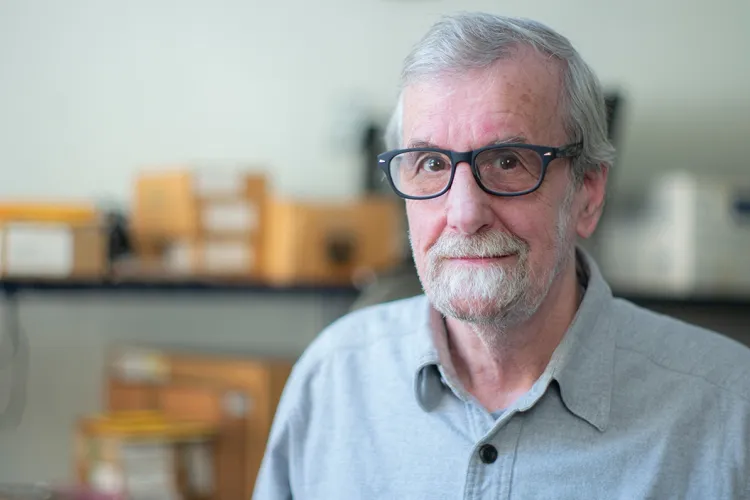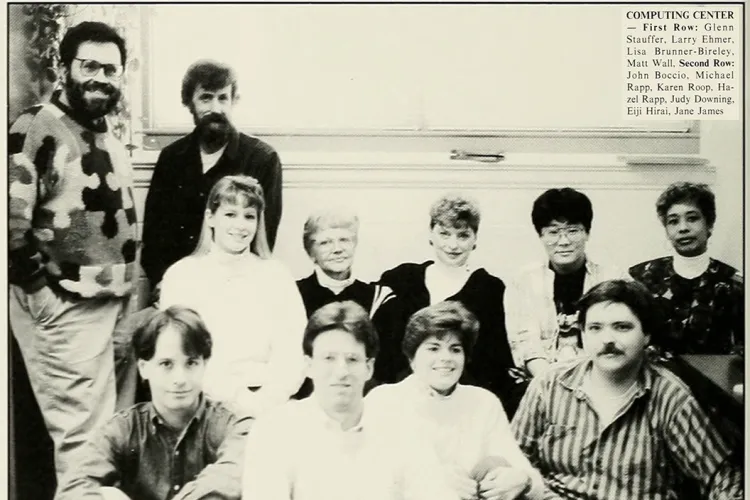Hardware Repair Technician Michael Rapp Reflects on Three Decades at Swarthmore

After fixing more than 9,200 computers and building lasting friendships, Rapp will work his last day on January 17.
Before the computer became the center of Michael Rapp’s career, it destroyed it.
In the early 1970s, the Swarthmore, Pa., native had “sort of fallen into” owning a jewelry engraving business in Center City Philadelphia. He engraved by hand with a tiny device, doing well enough within the first year to pay back the loan his father had given him to buy the business and begin turning profits.
But then, in the early 1980s, came the future: the computer-controlled engraving machine.
“That pretty much put me out of business,” says Rapp.
He can better appreciate the irony now, in his final week at the College, where he has spent the past 28 years fixing more than 9,200 computers and building lasting friendships with faculty, staff, and students. But at the time, seeing the opportunity within the setback took ingenuity.
Rapp, who knew very little about computers, went to a technical school to study them. Then he heard about a job opening in what was then called the Computing Center at Swarthmore, where his mother, Hazel, worked as an administrative assistant.

Rapp worked with his mother, Hazel, as a member of the College's Computing Center staff, as seen in the 1992 Halcyon.
“I had just finished school, so it was perfect timing,” says Rapp, who became the new hardware repair technician in 1990.
Back then there were 12 employees on the computing team, compared with the 40 employed by Information Technology Services (ITS) today. The hard drives Rapp worked on were “big old things” that cost more than $1,000, unlike today’s that fit in your hand for closer to $50. The laptops seem to get smaller by the year, he says, to the point that their screws look like the ones he used to find in watches.
“It’s been amazing to see all the changes over the years,” Rapp says. “It really has.”
But in most ways, the job hasn’t changed much. His has been a one-man shop for any repairs to computers brought in by staff, faculty, or students. He ordered and installed the parts and got rid of the bad ones, keeping close tabs on his inventory as well as technological advances.
Rapp’s greatest challenges have been computers with more than one failed component, and the ones whose users didn’t bother to back them up. But while Rapp regards the latter as his “main gripe,” he’s enjoyed the ride.
“It’s very satisfying to fix someone’s computer,” he says, “especially for students who are scared that all of their files have disappeared.”
Rapp counts such interactions with students among his fondest memories at Swarthmore.
“I’m amazed at how knowledgeable they are with computers, for one thing, having grown up with them,” he says. “But I am so grateful to have gotten to know so many of them as people, and meeting students from places like Nepal, which I would never have been able to do in my regular life.”
Those feelings extend to the College at large, which Rapp considers “more like a family than a company.” He will fondly remember the staff and faculty with whom he built friendships over the years, and the feeling is mutual.
“You could not find a more genuine person on campus,” says Kathryn Timmons, administrative coordinator of psychology. “His sense of humor, kindness, professionalism, and treatment of those of us who know him and have worked with him are beyond measure in my book.”
“Michael is truly one of the most kindhearted people I know,” adds Heather Dumigan, technical support specialist in ITS. “I consider myself incredibly lucky to have him as a co-worker and friend, and can’t imagine Swarthmore without him.”
Rapp will still be close by, 4 miles from campus in Glenolden, but he hopes to soon kick off a string of travel at the Grand Canyon. As he finished cleaning up his office in advance of his final day, this Thursday, he offered parting words of appreciation—and an admonition.
“Back up your computers,” he says, at once smiling and serious. “It’s not that hard anymore.”



